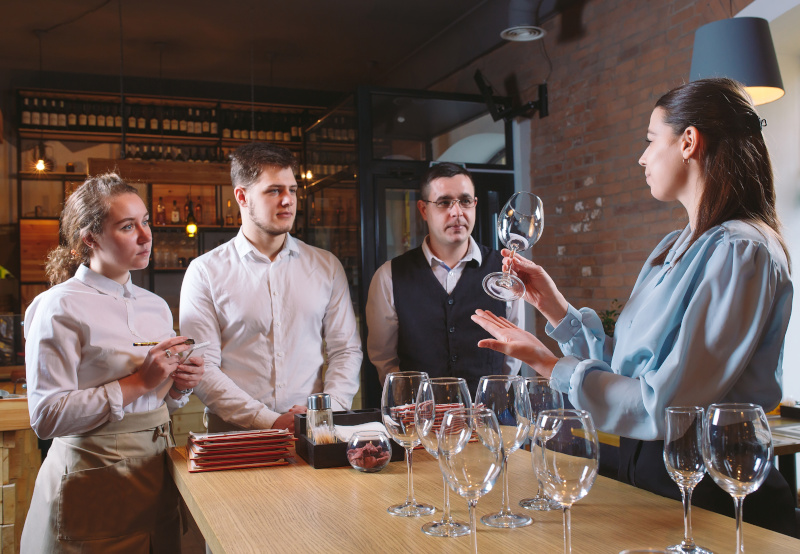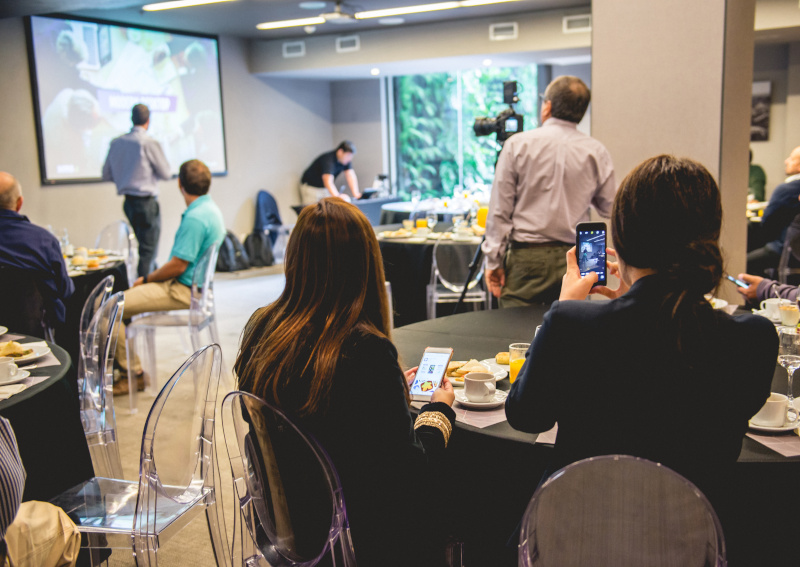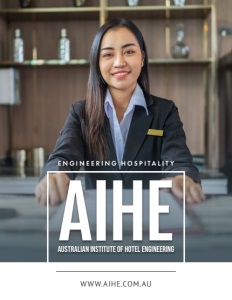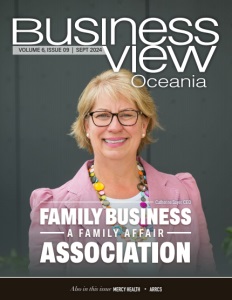Australian Institute of Hotel Engineering (AIHE)
Engineering Hospitality
Designing the best guest experience through creative craftsmanship
In the hospitality industry, where guest experience often takes center stage, the unsung heroes ensuring everything runs smoothly are the hotel engineers. These professionals play a critical role in the overall success of a hotel, from maintaining the physical integrity of the building to implementing cutting-edge technology and sustainability practices. At the helm of this field in Australia is Anura Yapa, President of the New South Wales chapter of the Australian Institute of Hotel Engineering (AIHE) and Area Director of Engineering Australasia for Shangri-La Hotels. Yapa’s journey and his work with the AIHE shed light on hotel engineers’ role in the evolving landscape of the hospitality industry.
The backbone of hospitality
The Australian Institute of Hotel Engineering has a storied history dating back to 1989 when a small group of hotel engineers in Queensland, led by founder Neil Weenink, came together to discuss the challenges they faced in their profession. These meetings provided a platform for engineers to exchange ideas, share solutions, and collectively elevate the standards of hotel maintenance and operations. This collaborative spirit led to the expansion of the AIHE into other states, including New South Wales and Western Australia.
In the early 2000s, Yapa and a few fellow engineers took the initiative to establish the Victorian chapter, further broadening the institute’s reach. “The early days were all about bringing engineers together to solve common problems and to keep up with the rapid technological advancements in the industry,” Yapa recalls. “We wanted to create a community where knowledge could be shared freely, and everyone could benefit.”
However, the onset of the COVID-19 pandemic 2019 presented unprecedented challenges for the AIHE. The disruption caused by the pandemic led to suspending activities in several chapters as many engineers left the industry or shifted to different sectors. Despite these setbacks, the New South Wales chapter has remained active under Yapa’s leadership and continues to thrive, serving as an example of resilience and dedication to the profession.
Equipping the industry’s best
The AIHE’s mission is to ensure that hotel engineers and their teams are equipped with the latest knowledge and skills to maintain and enhance hotel operations. This mission is pursued through various activities, including monthly meetings, educational conferences, and technical site visits. “Our goal is to keep our members at the forefront of the industry,” says Yapa. “We want to ensure that they are not just keeping up with changes but leading them.”
The institute offers seven membership categories, catering to a wide range of industry professionals. These categories include fellow members, honorary fellows, members, associates, students, affiliates, and corporate members. Originally, membership was primarily focused on chief engineers, but Yapa saw the need to include second-in-command engineers, recognizing their potential to become future leaders. “It’s important to nurture the next generation of hotel engineers,” Yapa explains. “They are the ones who will carry the torch forward.”

Connecting the community
Effective communication and engagement are key pillars of the AIHE’s strategy to support its members. The institute’s monthly meetings are the cornerstone of its communication efforts, providing a regular forum for members to discuss industry trends, share experiences, and learn from one another. These meetings are held in hotels across New South Wales, often with the generous support of hotel general managers who provide meeting spaces at little or no cost.
In addition to these in-person gatherings, the AIHE has embraced digital communication platforms, including LinkedIn and WhatsApp groups, to keep members connected and informed. “We use these platforms to share updates, announce meetings, and facilitate discussions,” Yapa notes. “It’s all about keeping the lines of communication open and ensuring that our members feel supported.”
The institute also organizes site visits to key locations, such as the Sydney Opera House, where members can explore the technical aspects of these iconic sites and learn about the latest advancements in building technologies. “These visits are invaluable,” says Yapa. “They give our members a first-hand look at how cutting-edge technologies are being implemented in real-world settings.”
Tackling industry challenges
The hotel industry is not without its challenges; hotel engineers often find themselves at the forefront of addressing these issues. One of the most significant challenges currently facing the industry is the shortage of specialized contractors. As the hospitality sector rebounds from the pandemic, with occupancy rates soaring and room prices increasing, the demand for maintenance and technical services has outpaced the supply of skilled contractors.
“Even though hotels are financially strong and ready to invest in maintenance and upgrades, getting the right contractors and supplies on time is a major challenge,” Yapa explains. “This is where our community becomes invaluable. We can share recommendations and find reliable solutions through our meetings and discussions.”
The AIHE has introduced roundtable discussions further to support its members as part of its regular meetings. These sessions allow engineers to dive deep into specific issues, such as chiller malfunctions or boiler maintenance, and explore potential solutions collaboratively. “These discussions are vital to our work,” says Yapa. “They provide a space where engineers can share their experiences, learn from each other, and develop practical solutions to common problems.”
Forging partnerships for sustainability and innovation
Sustainability is a core focus for the AIHE, and the institute has formed key partnerships to advance this goal. One of the most significant is the institute’s collaboration with the City of Sydney through the Sustainable Destination Partnership. This initiative is part of a broader effort to achieve net-zero carbon emissions by 2030 and 2050, with hotels playing a crucial role in reducing energy consumption, water usage, and waste production.
As part of this partnership, hotels share their energy and water usage data with the City of Sydney, which provides financial support for energy audits and other sustainability initiatives. “This partnership is a win-win,” Yapa explains. “It helps hotels reduce their environmental footprint while lowering operational costs.”
Yapa himself is a member of the City of Sydney’s technical working group, where he contributes to discussions on allocating resources and grants to support sustainability initiatives in the hospitality sector. “Our role is to ensure that the engineering side of hotel operations is aligned with broader sustainability goals,” he says. “It’s about finding practical ways to reduce our impact on the environment while maintaining the high standards our guests expect.”
Preparing for the next generation
Looking to the future, Yapa is optimistic about the prospects for hotel engineering in Australia. With several new hotels slated to open in Sydney and significant refurbishments underway in existing properties, the demand for skilled engineers will only increase. “The hotel industry is booming, and with that comes a growing need for experienced engineers who can manage these complex operations,” Yapa notes.
However, Yapa also acknowledges the challenges that come with this growth. Many experienced engineers have left the industry during the pandemic, leading to a shortage of skilled professionals. To address this, the AIHE has launched training programs to develop the next generation of hotel engineers. “We’re focusing on both the technical skills and the unique aspects of hotel engineering,” Yapa explains. “It’s not just about knowing how a boiler works; it’s about understanding how to optimize energy use, manage capital projects, and enhance guest satisfaction.”
Training young engineers is a priority for Yapa, particularly given the industry’s significant turnover. “Many of the engineers coming into the industry now are new, and they need support to get up to speed,” he says. We’re working closely with hotel general managers to encourage participation in our programs and ensure that these new engineers have the tools they need to succeed.”

The importance of awards and acknowledgement
Recognition is another area where Yapa is driving change. Historically, awards in the hospitality industry have focused on front-of-house staff, with little recognition for the contributions of behind-the-scenes professionals like engineers. To address this imbalance, Yapa has proposed the introduction of a Junior Engineer of the Year category in the HM Awards, one of the industry’s most prestigious accolades.
“Hotel engineering is much more than fixing lights or unblocking drains,” Yapa emphasizes. “It’s about implementing sustainable practices, managing complex systems, and ensuring guests have a seamless experience. We must recognize and celebrate the incredible work that hotel engineers do daily.”
The AIHE is also committed to the welfare of its members, providing financial support for engineers facing personal hardships. For example, the New South Wales chapter has established a fund to assist the families of engineers who have passed away, helping with expenses such as school fees and university tuition. “We are more than just a professional association; we are a community that looks out for one another,” Yapa says. “Our goal is to support our members in every aspect of their lives, professional and personal.”
AIHE’s vision for advancing hotel engineering
As the hospitality industry continues to evolve, hotel engineers’ roles will only become more important. The Australian Institute of Hotel Engineering, under the leadership of Anura Yapa, is committed to supporting these professionals through education, innovation, and community engagement. Whether training the next generation of engineers, driving sustainability initiatives, or providing a space for professionals to share their experiences, the AIHE is vital in shaping the future of hotel engineering in Australia.
Yapa’s vision for the AIHE is one of continued growth and excellence. “We want to bring the industry back to where it was before 2019 and then take it even further,” he says. “Our goal is to ensure that every hotel in Australia has access to the best engineering talent and the latest technologies so that they can continue to provide exceptional experiences for its guests.”
AT A GLANCE
Australian Institute of Hotel Engineering (AIHE)
What: A professional organization that focuses on providing its members with the latest engineering, construction, and technology developments tailored to the hotel industry.
Where: Headquartered in Australia with active chapters in multiple Australian states, including Queensland, Victoria, New South Wales, and Western Australia.
Website: http://www.aihe.com.au/




 This information will never be shared to third parties
This information will never be shared to third parties